Business Communication: Analysis, Principles, and Recommendations
VerifiedAdded on 2023/01/11
|8
|1896
|61
Report
AI Summary
This report provides a comprehensive analysis of business communication, focusing on its purposes and principles within an organizational context. It delves into the principles of effective communication, such as clarity, attention, feedback, and consistency, to enhance communication practices. The report evaluates various communication practices, including the use of emails, meetings, and other channels, and assesses their strengths and weaknesses. It offers recommendations for improving communication effectiveness, such as implementing a central communication system and evaluating the quality of communication tools. The conclusion highlights the importance of aligning communication with organizational goals and the continuous evaluation of communication practices for improvement.
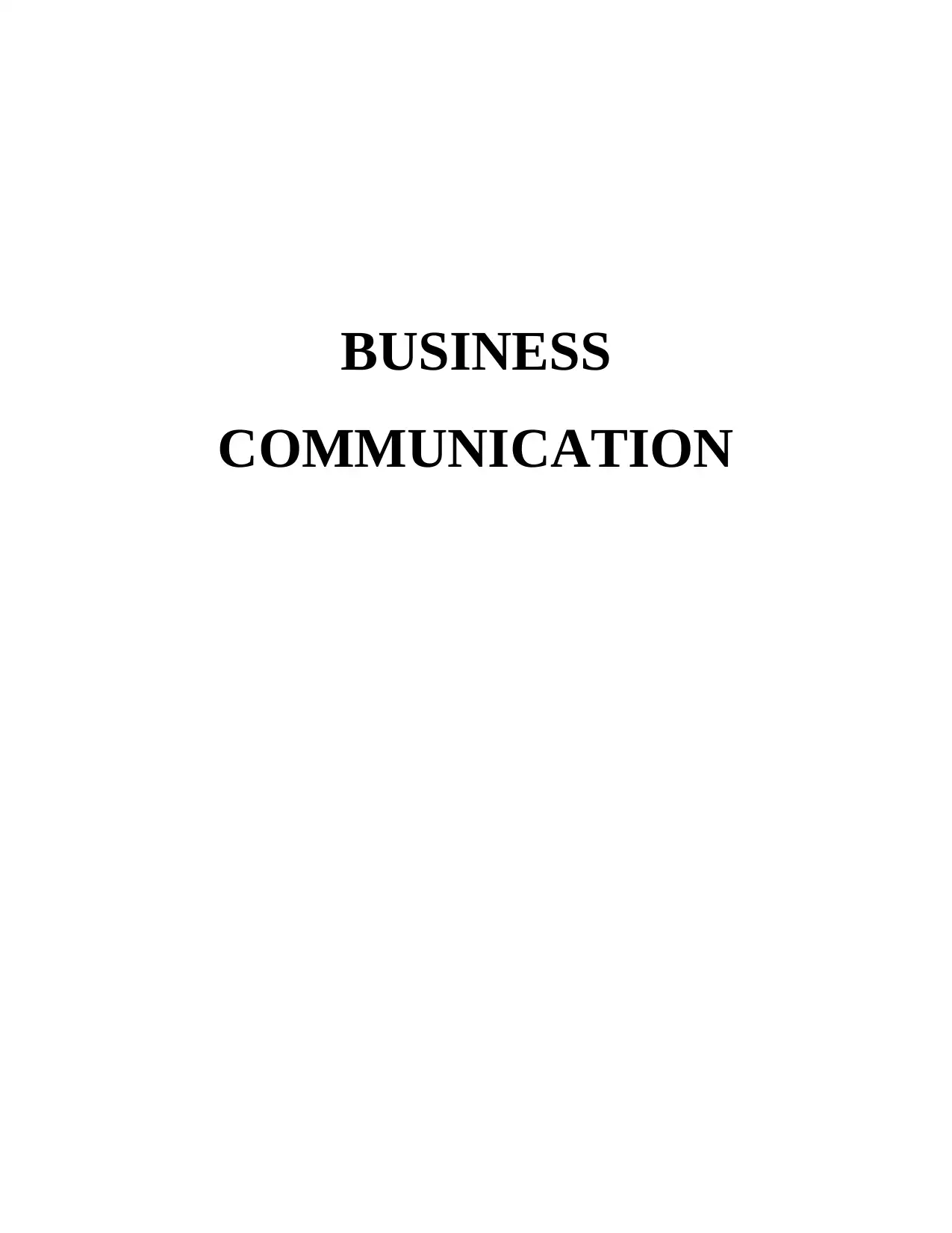
BUSINESS
COMMUNICATION
COMMUNICATION
Paraphrase This Document
Need a fresh take? Get an instant paraphrase of this document with our AI Paraphraser
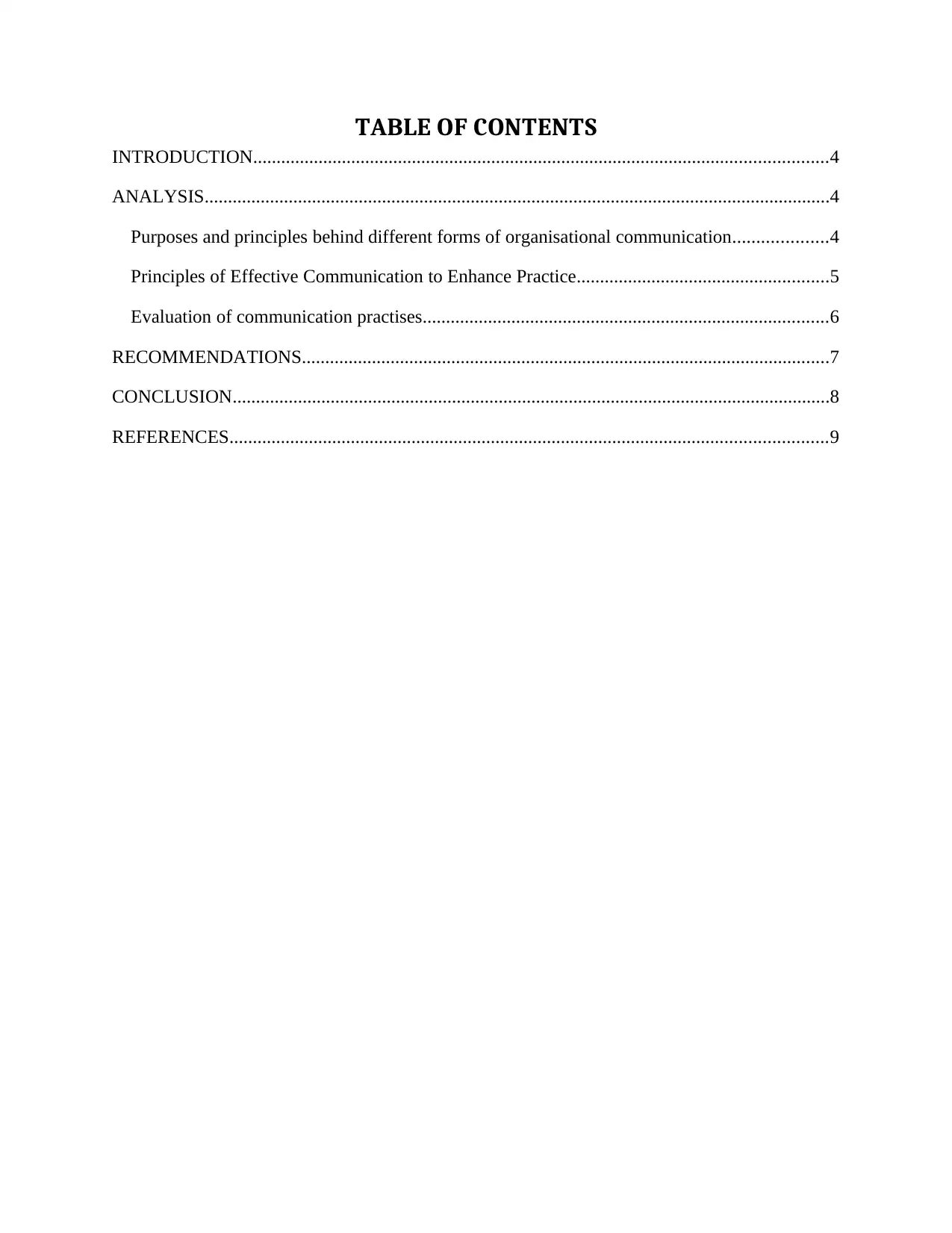
TABLE OF CONTENTS
INTRODUCTION...........................................................................................................................4
ANALYSIS......................................................................................................................................4
Purposes and principles behind different forms of organisational communication....................4
Principles of Effective Communication to Enhance Practice......................................................5
Evaluation of communication practises.......................................................................................6
RECOMMENDATIONS.................................................................................................................7
CONCLUSION................................................................................................................................8
REFERENCES................................................................................................................................9
INTRODUCTION...........................................................................................................................4
ANALYSIS......................................................................................................................................4
Purposes and principles behind different forms of organisational communication....................4
Principles of Effective Communication to Enhance Practice......................................................5
Evaluation of communication practises.......................................................................................6
RECOMMENDATIONS.................................................................................................................7
CONCLUSION................................................................................................................................8
REFERENCES................................................................................................................................9
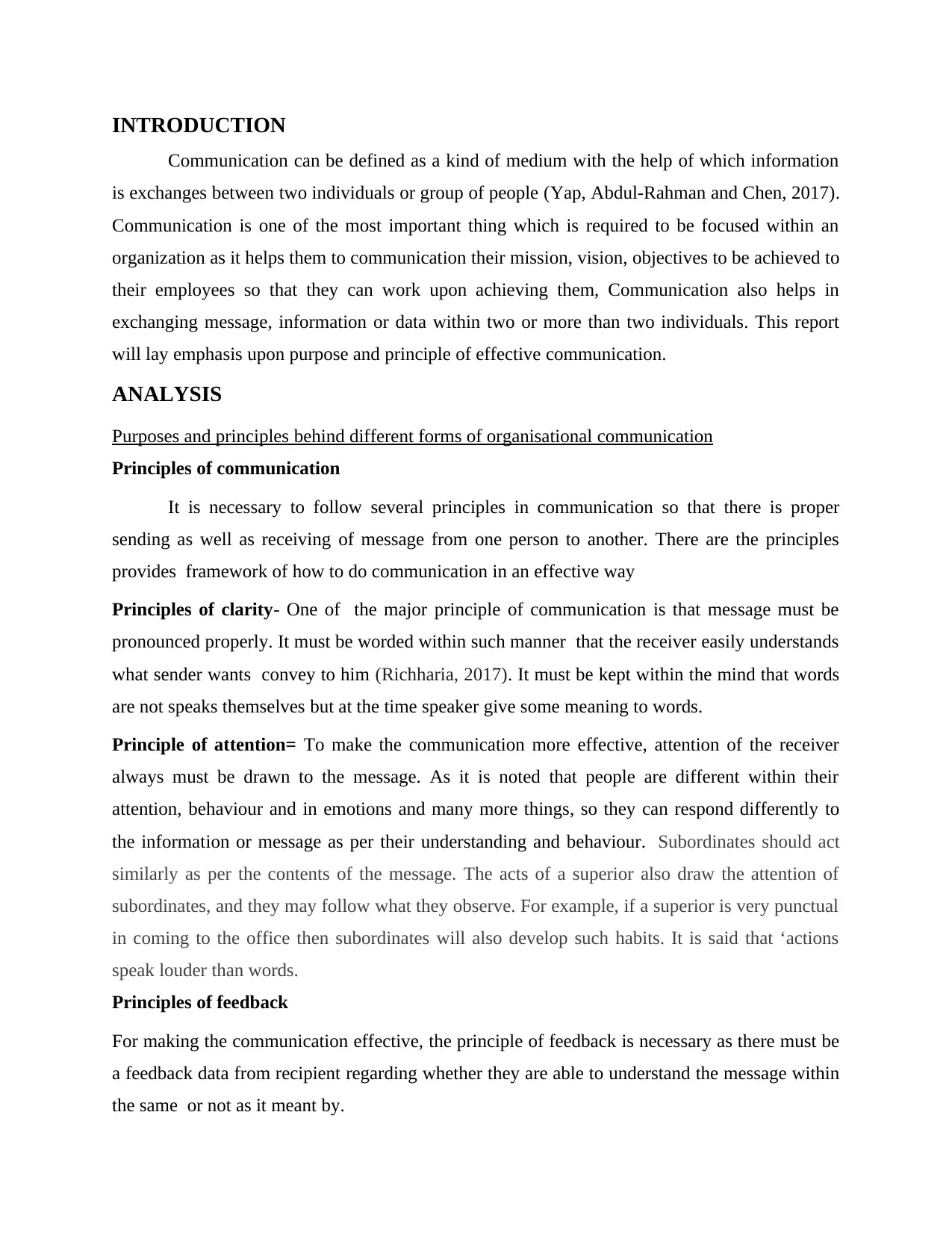
INTRODUCTION
Communication can be defined as a kind of medium with the help of which information
is exchanges between two individuals or group of people (Yap, Abdul-Rahman and Chen, 2017).
Communication is one of the most important thing which is required to be focused within an
organization as it helps them to communication their mission, vision, objectives to be achieved to
their employees so that they can work upon achieving them, Communication also helps in
exchanging message, information or data within two or more than two individuals. This report
will lay emphasis upon purpose and principle of effective communication.
ANALYSIS
Purposes and principles behind different forms of organisational communication
Principles of communication
It is necessary to follow several principles in communication so that there is proper
sending as well as receiving of message from one person to another. There are the principles
provides framework of how to do communication in an effective way
Principles of clarity- One of the major principle of communication is that message must be
pronounced properly. It must be worded within such manner that the receiver easily understands
what sender wants convey to him (Richharia, 2017). It must be kept within the mind that words
are not speaks themselves but at the time speaker give some meaning to words.
Principle of attention= To make the communication more effective, attention of the receiver
always must be drawn to the message. As it is noted that people are different within their
attention, behaviour and in emotions and many more things, so they can respond differently to
the information or message as per their understanding and behaviour. Subordinates should act
similarly as per the contents of the message. The acts of a superior also draw the attention of
subordinates, and they may follow what they observe. For example, if a superior is very punctual
in coming to the office then subordinates will also develop such habits. It is said that ‘actions
speak louder than words.
Principles of feedback
For making the communication effective, the principle of feedback is necessary as there must be
a feedback data from recipient regarding whether they are able to understand the message within
the same or not as it meant by.
Communication can be defined as a kind of medium with the help of which information
is exchanges between two individuals or group of people (Yap, Abdul-Rahman and Chen, 2017).
Communication is one of the most important thing which is required to be focused within an
organization as it helps them to communication their mission, vision, objectives to be achieved to
their employees so that they can work upon achieving them, Communication also helps in
exchanging message, information or data within two or more than two individuals. This report
will lay emphasis upon purpose and principle of effective communication.
ANALYSIS
Purposes and principles behind different forms of organisational communication
Principles of communication
It is necessary to follow several principles in communication so that there is proper
sending as well as receiving of message from one person to another. There are the principles
provides framework of how to do communication in an effective way
Principles of clarity- One of the major principle of communication is that message must be
pronounced properly. It must be worded within such manner that the receiver easily understands
what sender wants convey to him (Richharia, 2017). It must be kept within the mind that words
are not speaks themselves but at the time speaker give some meaning to words.
Principle of attention= To make the communication more effective, attention of the receiver
always must be drawn to the message. As it is noted that people are different within their
attention, behaviour and in emotions and many more things, so they can respond differently to
the information or message as per their understanding and behaviour. Subordinates should act
similarly as per the contents of the message. The acts of a superior also draw the attention of
subordinates, and they may follow what they observe. For example, if a superior is very punctual
in coming to the office then subordinates will also develop such habits. It is said that ‘actions
speak louder than words.
Principles of feedback
For making the communication effective, the principle of feedback is necessary as there must be
a feedback data from recipient regarding whether they are able to understand the message within
the same or not as it meant by.
⊘ This is a preview!⊘
Do you want full access?
Subscribe today to unlock all pages.

Trusted by 1+ million students worldwide
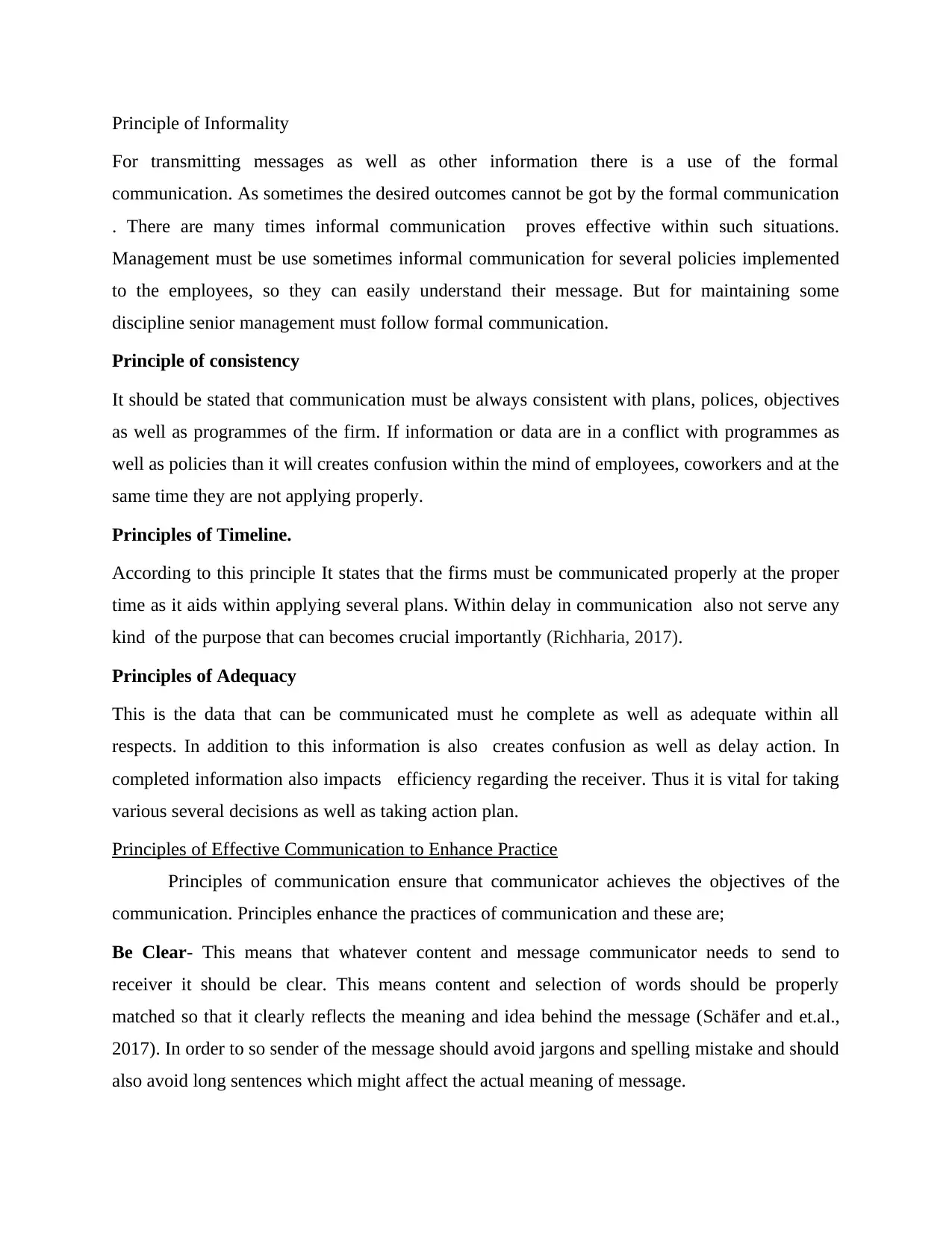
Principle of Informality
For transmitting messages as well as other information there is a use of the formal
communication. As sometimes the desired outcomes cannot be got by the formal communication
. There are many times informal communication proves effective within such situations.
Management must be use sometimes informal communication for several policies implemented
to the employees, so they can easily understand their message. But for maintaining some
discipline senior management must follow formal communication.
Principle of consistency
It should be stated that communication must be always consistent with plans, polices, objectives
as well as programmes of the firm. If information or data are in a conflict with programmes as
well as policies than it will creates confusion within the mind of employees, coworkers and at the
same time they are not applying properly.
Principles of Timeline.
According to this principle It states that the firms must be communicated properly at the proper
time as it aids within applying several plans. Within delay in communication also not serve any
kind of the purpose that can becomes crucial importantly (Richharia, 2017).
Principles of Adequacy
This is the data that can be communicated must he complete as well as adequate within all
respects. In addition to this information is also creates confusion as well as delay action. In
completed information also impacts efficiency regarding the receiver. Thus it is vital for taking
various several decisions as well as taking action plan.
Principles of Effective Communication to Enhance Practice
Principles of communication ensure that communicator achieves the objectives of the
communication. Principles enhance the practices of communication and these are;
Be Clear- This means that whatever content and message communicator needs to send to
receiver it should be clear. This means content and selection of words should be properly
matched so that it clearly reflects the meaning and idea behind the message (Schäfer and et.al.,
2017). In order to so sender of the message should avoid jargons and spelling mistake and should
also avoid long sentences which might affect the actual meaning of message.
For transmitting messages as well as other information there is a use of the formal
communication. As sometimes the desired outcomes cannot be got by the formal communication
. There are many times informal communication proves effective within such situations.
Management must be use sometimes informal communication for several policies implemented
to the employees, so they can easily understand their message. But for maintaining some
discipline senior management must follow formal communication.
Principle of consistency
It should be stated that communication must be always consistent with plans, polices, objectives
as well as programmes of the firm. If information or data are in a conflict with programmes as
well as policies than it will creates confusion within the mind of employees, coworkers and at the
same time they are not applying properly.
Principles of Timeline.
According to this principle It states that the firms must be communicated properly at the proper
time as it aids within applying several plans. Within delay in communication also not serve any
kind of the purpose that can becomes crucial importantly (Richharia, 2017).
Principles of Adequacy
This is the data that can be communicated must he complete as well as adequate within all
respects. In addition to this information is also creates confusion as well as delay action. In
completed information also impacts efficiency regarding the receiver. Thus it is vital for taking
various several decisions as well as taking action plan.
Principles of Effective Communication to Enhance Practice
Principles of communication ensure that communicator achieves the objectives of the
communication. Principles enhance the practices of communication and these are;
Be Clear- This means that whatever content and message communicator needs to send to
receiver it should be clear. This means content and selection of words should be properly
matched so that it clearly reflects the meaning and idea behind the message (Schäfer and et.al.,
2017). In order to so sender of the message should avoid jargons and spelling mistake and should
also avoid long sentences which might affect the actual meaning of message.
Paraphrase This Document
Need a fresh take? Get an instant paraphrase of this document with our AI Paraphraser
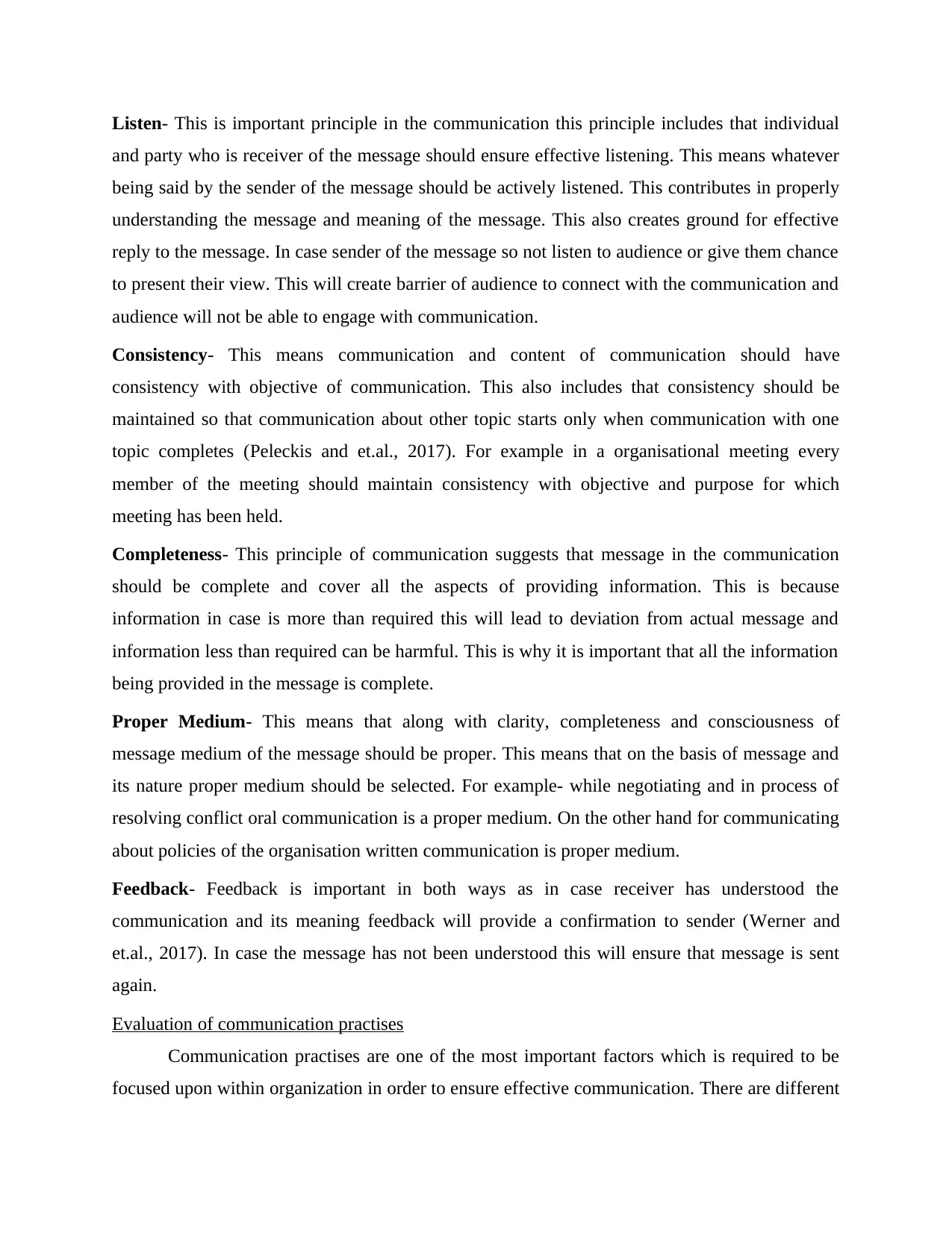
Listen- This is important principle in the communication this principle includes that individual
and party who is receiver of the message should ensure effective listening. This means whatever
being said by the sender of the message should be actively listened. This contributes in properly
understanding the message and meaning of the message. This also creates ground for effective
reply to the message. In case sender of the message so not listen to audience or give them chance
to present their view. This will create barrier of audience to connect with the communication and
audience will not be able to engage with communication.
Consistency- This means communication and content of communication should have
consistency with objective of communication. This also includes that consistency should be
maintained so that communication about other topic starts only when communication with one
topic completes (Peleckis and et.al., 2017). For example in a organisational meeting every
member of the meeting should maintain consistency with objective and purpose for which
meeting has been held.
Completeness- This principle of communication suggests that message in the communication
should be complete and cover all the aspects of providing information. This is because
information in case is more than required this will lead to deviation from actual message and
information less than required can be harmful. This is why it is important that all the information
being provided in the message is complete.
Proper Medium- This means that along with clarity, completeness and consciousness of
message medium of the message should be proper. This means that on the basis of message and
its nature proper medium should be selected. For example- while negotiating and in process of
resolving conflict oral communication is a proper medium. On the other hand for communicating
about policies of the organisation written communication is proper medium.
Feedback- Feedback is important in both ways as in case receiver has understood the
communication and its meaning feedback will provide a confirmation to sender (Werner and
et.al., 2017). In case the message has not been understood this will ensure that message is sent
again.
Evaluation of communication practises
Communication practises are one of the most important factors which is required to be
focused upon within organization in order to ensure effective communication. There are different
and party who is receiver of the message should ensure effective listening. This means whatever
being said by the sender of the message should be actively listened. This contributes in properly
understanding the message and meaning of the message. This also creates ground for effective
reply to the message. In case sender of the message so not listen to audience or give them chance
to present their view. This will create barrier of audience to connect with the communication and
audience will not be able to engage with communication.
Consistency- This means communication and content of communication should have
consistency with objective of communication. This also includes that consistency should be
maintained so that communication about other topic starts only when communication with one
topic completes (Peleckis and et.al., 2017). For example in a organisational meeting every
member of the meeting should maintain consistency with objective and purpose for which
meeting has been held.
Completeness- This principle of communication suggests that message in the communication
should be complete and cover all the aspects of providing information. This is because
information in case is more than required this will lead to deviation from actual message and
information less than required can be harmful. This is why it is important that all the information
being provided in the message is complete.
Proper Medium- This means that along with clarity, completeness and consciousness of
message medium of the message should be proper. This means that on the basis of message and
its nature proper medium should be selected. For example- while negotiating and in process of
resolving conflict oral communication is a proper medium. On the other hand for communicating
about policies of the organisation written communication is proper medium.
Feedback- Feedback is important in both ways as in case receiver has understood the
communication and its meaning feedback will provide a confirmation to sender (Werner and
et.al., 2017). In case the message has not been understood this will ensure that message is sent
again.
Evaluation of communication practises
Communication practises are one of the most important factors which is required to be
focused upon within organization in order to ensure effective communication. There are different
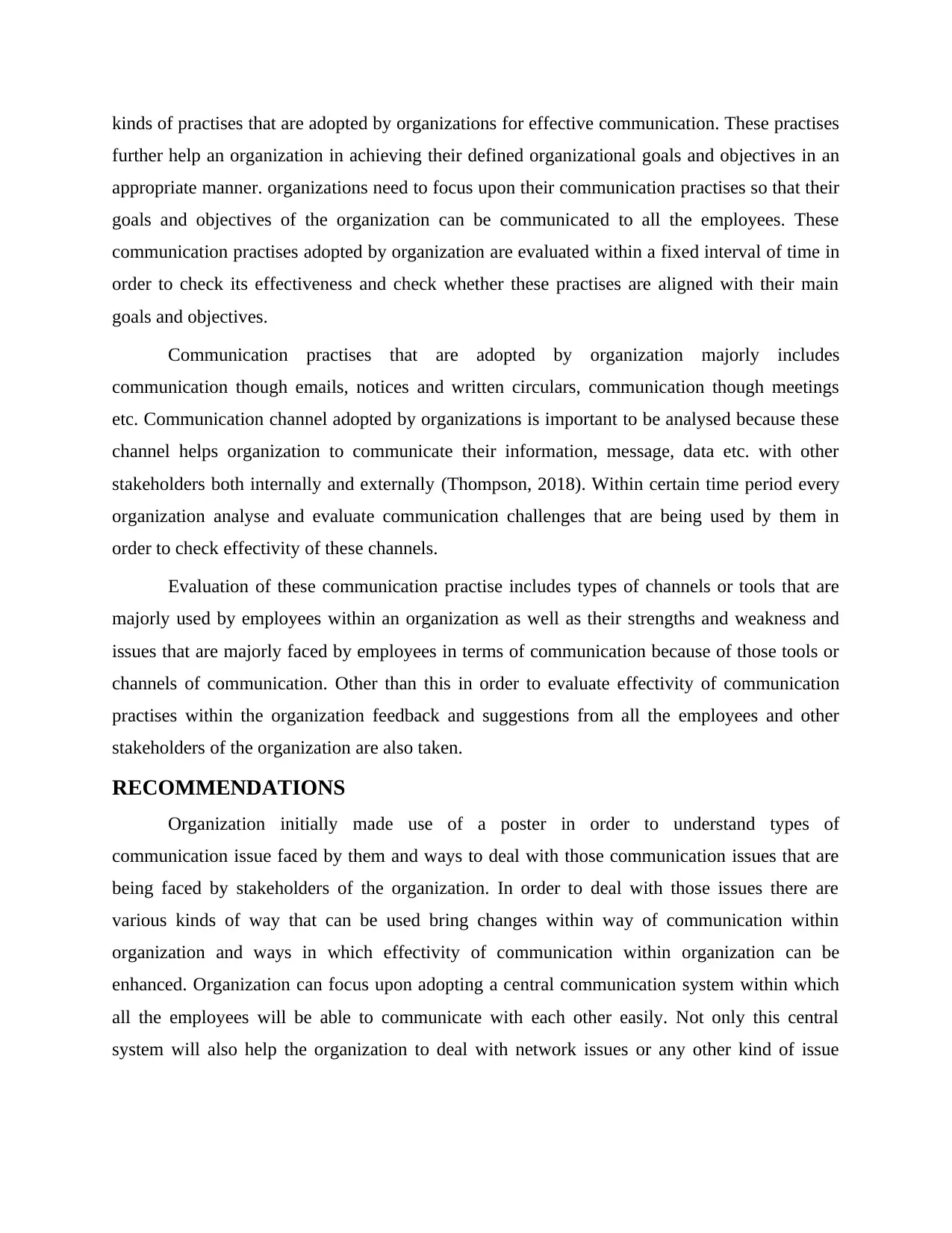
kinds of practises that are adopted by organizations for effective communication. These practises
further help an organization in achieving their defined organizational goals and objectives in an
appropriate manner. organizations need to focus upon their communication practises so that their
goals and objectives of the organization can be communicated to all the employees. These
communication practises adopted by organization are evaluated within a fixed interval of time in
order to check its effectiveness and check whether these practises are aligned with their main
goals and objectives.
Communication practises that are adopted by organization majorly includes
communication though emails, notices and written circulars, communication though meetings
etc. Communication channel adopted by organizations is important to be analysed because these
channel helps organization to communicate their information, message, data etc. with other
stakeholders both internally and externally (Thompson, 2018). Within certain time period every
organization analyse and evaluate communication challenges that are being used by them in
order to check effectivity of these channels.
Evaluation of these communication practise includes types of channels or tools that are
majorly used by employees within an organization as well as their strengths and weakness and
issues that are majorly faced by employees in terms of communication because of those tools or
channels of communication. Other than this in order to evaluate effectivity of communication
practises within the organization feedback and suggestions from all the employees and other
stakeholders of the organization are also taken.
RECOMMENDATIONS
Organization initially made use of a poster in order to understand types of
communication issue faced by them and ways to deal with those communication issues that are
being faced by stakeholders of the organization. In order to deal with those issues there are
various kinds of way that can be used bring changes within way of communication within
organization and ways in which effectivity of communication within organization can be
enhanced. Organization can focus upon adopting a central communication system within which
all the employees will be able to communicate with each other easily. Not only this central
system will also help the organization to deal with network issues or any other kind of issue
further help an organization in achieving their defined organizational goals and objectives in an
appropriate manner. organizations need to focus upon their communication practises so that their
goals and objectives of the organization can be communicated to all the employees. These
communication practises adopted by organization are evaluated within a fixed interval of time in
order to check its effectiveness and check whether these practises are aligned with their main
goals and objectives.
Communication practises that are adopted by organization majorly includes
communication though emails, notices and written circulars, communication though meetings
etc. Communication channel adopted by organizations is important to be analysed because these
channel helps organization to communicate their information, message, data etc. with other
stakeholders both internally and externally (Thompson, 2018). Within certain time period every
organization analyse and evaluate communication challenges that are being used by them in
order to check effectivity of these channels.
Evaluation of these communication practise includes types of channels or tools that are
majorly used by employees within an organization as well as their strengths and weakness and
issues that are majorly faced by employees in terms of communication because of those tools or
channels of communication. Other than this in order to evaluate effectivity of communication
practises within the organization feedback and suggestions from all the employees and other
stakeholders of the organization are also taken.
RECOMMENDATIONS
Organization initially made use of a poster in order to understand types of
communication issue faced by them and ways to deal with those communication issues that are
being faced by stakeholders of the organization. In order to deal with those issues there are
various kinds of way that can be used bring changes within way of communication within
organization and ways in which effectivity of communication within organization can be
enhanced. Organization can focus upon adopting a central communication system within which
all the employees will be able to communicate with each other easily. Not only this central
system will also help the organization to deal with network issues or any other kind of issue
⊘ This is a preview!⊘
Do you want full access?
Subscribe today to unlock all pages.

Trusted by 1+ million students worldwide
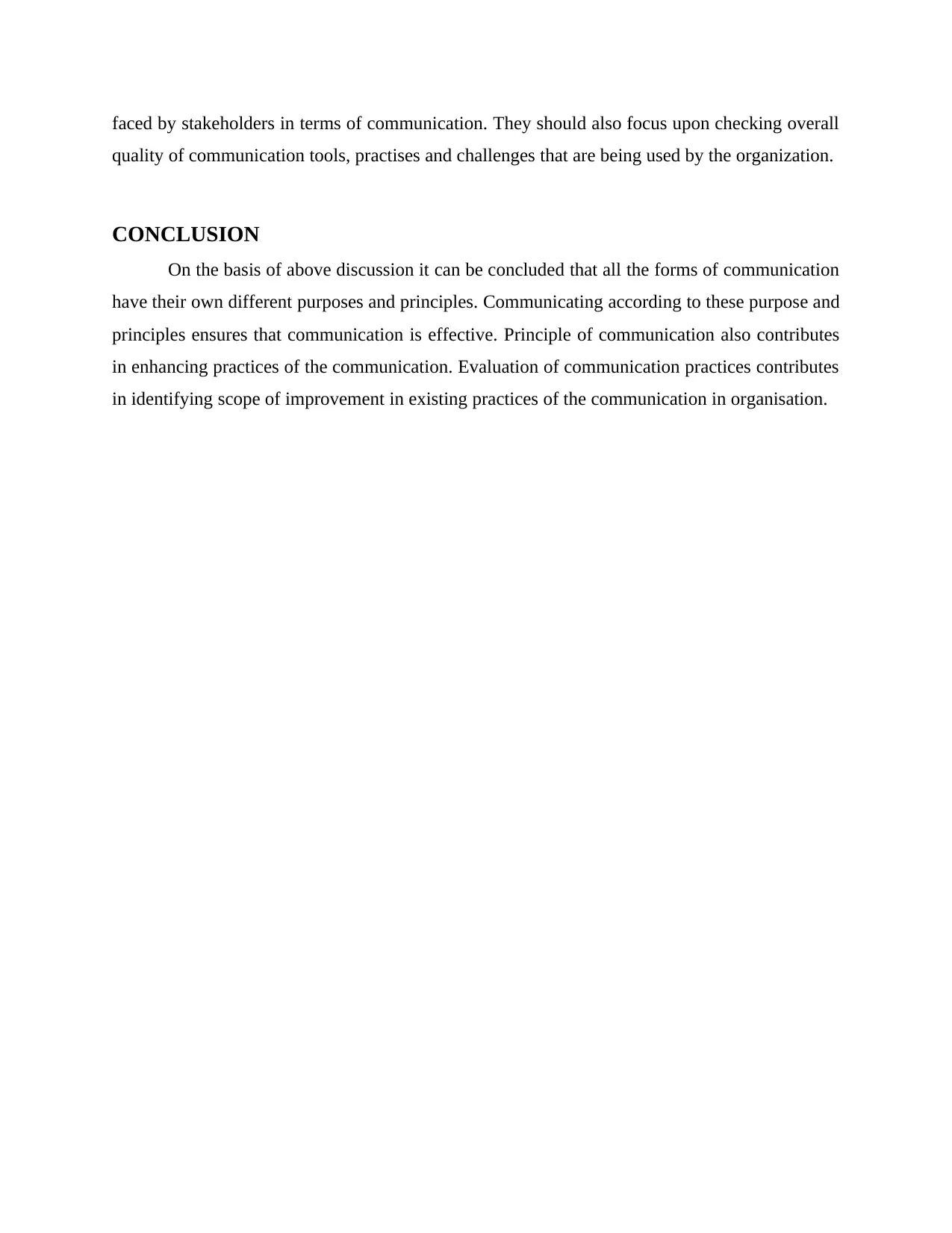
faced by stakeholders in terms of communication. They should also focus upon checking overall
quality of communication tools, practises and challenges that are being used by the organization.
CONCLUSION
On the basis of above discussion it can be concluded that all the forms of communication
have their own different purposes and principles. Communicating according to these purpose and
principles ensures that communication is effective. Principle of communication also contributes
in enhancing practices of the communication. Evaluation of communication practices contributes
in identifying scope of improvement in existing practices of the communication in organisation.
quality of communication tools, practises and challenges that are being used by the organization.
CONCLUSION
On the basis of above discussion it can be concluded that all the forms of communication
have their own different purposes and principles. Communicating according to these purpose and
principles ensures that communication is effective. Principle of communication also contributes
in enhancing practices of the communication. Evaluation of communication practices contributes
in identifying scope of improvement in existing practices of the communication in organisation.
Paraphrase This Document
Need a fresh take? Get an instant paraphrase of this document with our AI Paraphraser
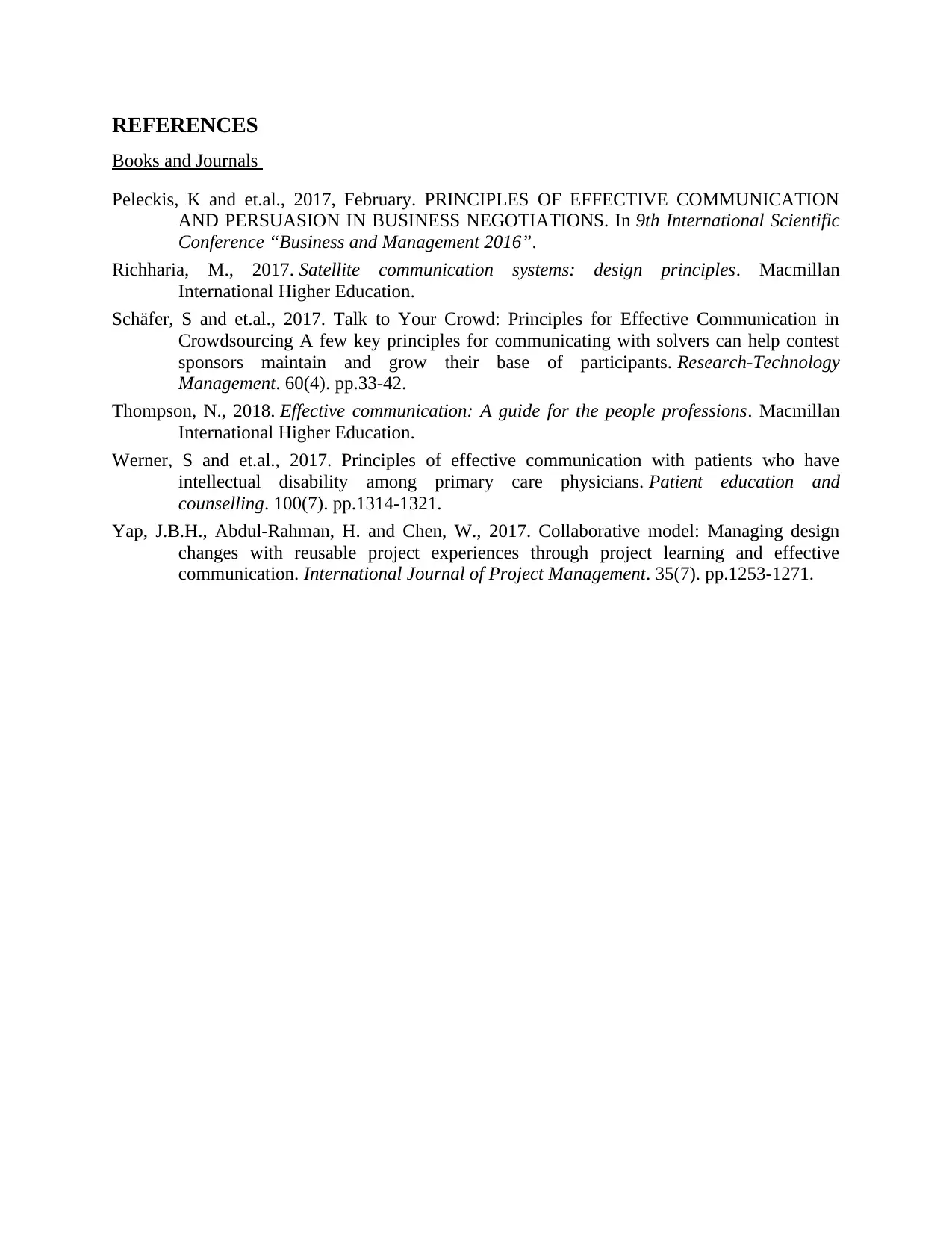
REFERENCES
Books and Journals
Peleckis, K and et.al., 2017, February. PRINCIPLES OF EFFECTIVE COMMUNICATION
AND PERSUASION IN BUSINESS NEGOTIATIONS. In 9th International Scientific
Conference “Business and Management 2016”.
Richharia, M., 2017. Satellite communication systems: design principles. Macmillan
International Higher Education.
Schäfer, S and et.al., 2017. Talk to Your Crowd: Principles for Effective Communication in
Crowdsourcing A few key principles for communicating with solvers can help contest
sponsors maintain and grow their base of participants. Research-Technology
Management. 60(4). pp.33-42.
Thompson, N., 2018. Effective communication: A guide for the people professions. Macmillan
International Higher Education.
Werner, S and et.al., 2017. Principles of effective communication with patients who have
intellectual disability among primary care physicians. Patient education and
counselling. 100(7). pp.1314-1321.
Yap, J.B.H., Abdul-Rahman, H. and Chen, W., 2017. Collaborative model: Managing design
changes with reusable project experiences through project learning and effective
communication. International Journal of Project Management. 35(7). pp.1253-1271.
Books and Journals
Peleckis, K and et.al., 2017, February. PRINCIPLES OF EFFECTIVE COMMUNICATION
AND PERSUASION IN BUSINESS NEGOTIATIONS. In 9th International Scientific
Conference “Business and Management 2016”.
Richharia, M., 2017. Satellite communication systems: design principles. Macmillan
International Higher Education.
Schäfer, S and et.al., 2017. Talk to Your Crowd: Principles for Effective Communication in
Crowdsourcing A few key principles for communicating with solvers can help contest
sponsors maintain and grow their base of participants. Research-Technology
Management. 60(4). pp.33-42.
Thompson, N., 2018. Effective communication: A guide for the people professions. Macmillan
International Higher Education.
Werner, S and et.al., 2017. Principles of effective communication with patients who have
intellectual disability among primary care physicians. Patient education and
counselling. 100(7). pp.1314-1321.
Yap, J.B.H., Abdul-Rahman, H. and Chen, W., 2017. Collaborative model: Managing design
changes with reusable project experiences through project learning and effective
communication. International Journal of Project Management. 35(7). pp.1253-1271.
1 out of 8
Related Documents
Your All-in-One AI-Powered Toolkit for Academic Success.
+13062052269
info@desklib.com
Available 24*7 on WhatsApp / Email
![[object Object]](/_next/static/media/star-bottom.7253800d.svg)
Unlock your academic potential
Copyright © 2020–2026 A2Z Services. All Rights Reserved. Developed and managed by ZUCOL.





